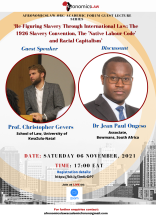Call for Papers: Dollar Hegemony, State Sovereignty and International Order: an International Workshop
To this end, we seek contributions from economists, IR scholars, political theo-rists, historians, sociologists and lawyers to explore this important question as well as its theoretical and practical implications. We will explore these and other urgent question in a two-day workshop that will take place on the 5th and 6th of December 2024 at the University of New South Wales (Sydney, Australia). If interested, please send us an abstract of no more than 400 words and a short bio of no more than 50 words by the 1st of July 2024 at dollarandsovereignty@gmail.com. Limited funding may be available for speakers who do not have access to institutional funding.
